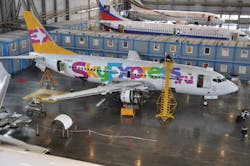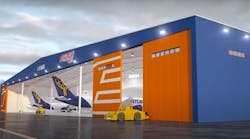The Russian MRO industry is on the verge of big changes, amid the ever growing demand for MRO services in the local market, as well as scheduled implementation of a series of large-scale investment projects.
For example, the U.S. AAR company has officially started the implementation of an ambitious project, which involves the construction of Russia's largest MRO center, which is expected to be located in the Ulyanovsk-East special economic zone in the city of Ulyanovsk.
The new center is expected to be commissioned at the beginning of 2015 and will specialize in the provision of MRO services mainly to such aircraft as Boeing 777, Boeing 747 and Airbus 340.
It will be located on the area of ??20,000 square meters, and will be able to provide MRO services simultaneously to eight narrow-bodied or two wide-bodied aircraft.
In addition to Boeing and Airbus aircraft, the new AAR center will also specialize in the provision of MRO services to such Russian aircraft as Sukhoi Superjet, as well as MS-21 mainline aircraft.
The AAR project is just the first in the list of large-scale investment projects, announced for implementation in the Russian market MRO.
Potential for future growth
In recent years the Russian MRO market has significantly grown and has big potential for further development.
Since the collapse of the USSR, the market has gone through several stages of development. In 1992, the first Western-made aircraft - Airbus A310 was launched on Russian airlines. In 1996 Russian MRO providers for the first time received permission to perform MRO in accordance with the EASA Part 145 regulation.
In 2004, the first MRO C-check on the Airbus A320 aircraft was completed in the country, while in 2006, Russia's first center for training of MRO specialists in accordance with the EAEA Part 147 regulation was certified.
Finally, in 2011 the government abolished customs duty on the supply of components and spare parts for foreign aircraft.
According to predictions of Jonathan Berger, vice president of ICF SH&E, one of the world’s leading analyst agencies in the field of aviation and MRO services, currently the Russian market of MRO services is estimated at USD $2.6 billion, while by 2025 it is expected to reach USD $5.6 billion.
Currently the Russian market of MRO services remains at the stage of rapid development, while the majority of local airlines still prefer to receive MRO services for their aircrafts abroad. However, in recent years this situation has changed, which is reflected by the fact that the share of MRO services, provided by domestic companies in total volume of MRO services last year has reached 40 percent and continues to grow.
Russian MRO service providers
At present among the major Russian MRO service providers are such companies as Aeroflot ATC, Volga-Dnepr Technician, Transaero Technician, ATB Oreneyr, Ural Airlines, AK Yamal, AK Saha, AK Russia, NordTech, FL Technics, and Vostok Technical Services. At the same time German Lufthansa Technik remains the leading foreign player in the market.
As a rule, a significant part of Russia’s leading airlines, which conduct their MRO within the country, have their own MRO centers. And, among Russia’s leading independent MRO providers are such companies as FL Technics and Vostok Technical Services.
Mikhail Somov, general director of Sibir Technik, one of Russia’s largest MRO providers, comments, “At present the Russian market of MRO services is considered as very promising. The share of Boeing and Airbus aircraft in the fleet of the majority of Russian airlines is steadily growing and this trend will continue to be observed during the next several years. This stimulates the growth of the domestic MRO market. At the same time high percentage of used aircrafts remains one of the features of the local market.”
Somov’s statement is confirmed by statistics, in accordance to which, the share of Boeing and Airbus aircraft in total Russian aviation fleet in 2012 reached 83 percent. This is the highest figure in the history of the Russian aviation. The market is dominated by narrow-bodied Boeing 737 and Airbus A320 aircraft, which form the basis of the Russian MRO market.
In the meantime, the majority of local analysts believe that the current situation in the market and lack of strong local players provides a good opportunity to the world’s leading MRO providers to start an expansion of the Russian market. However, there is also a need to pay attention to its major features, which could prevent its rapid expansion.
Russia’s market
Among the main features of the Russian MRO market are seasonality, as the largest number of orders for MRO services is registered during the period from mid-winter to mid-spring. In addition, the high average age of local fleet currently can be considered as another feature of the market. At present, aircraft, aged at 15 years and more, account for more than half of the total Russian fleet. While the share of new aircraft, aged under five years, is still small and accounts for no more than 10 to 15 percent.
Many of Russia’s leading MRO service providers are affiliated with the airports, which negatively affects the level of competition in the market, as well as significantly reduces the number of potential customers.
In the cost structure, up to 40 percent of costs account for MRO of engines. Line maintenance and repair of components accounts for 25 percent of costs each, followed by overhaul (10 percent) and modernization (about 5 percent).
The Russian government has made significant efforts for the improvement of the national legislation in the field of MRO and abolished customs duties on the imports of spare parts and equipment for MRO services. Due to traditional Russian bureaucracy, its supplies may still be associated with big delays, which take up to five to14 days, compared to the EU’s 72 hours. In this regard, many airlines prefer to complete their MROs abroad.
Another obstacle that prevents the provision of MRO services to foreign aircraft in Russia is the right of a local customs service to require cash collateral for the period of temporary import of the aircraft, which is equal to its customs value.
Government reaction
In the meantime, the Russian government is aware of the current problems in the industry, and is considering how to solve them. As part of this, some steps have already been taken. In addition to customs duties, the government has recently abolished compulsory licensing on the imports of high-frequency radio equipment and devices to the country.
According to analysts of the Russian Association of Airlines, the government should continue to implement its efforts, aimed at developing the domestic MRO industry. In particular, it should improve conditions for the establishment of MRO bases throughout the territory of the country, as well as stimulation of domestic airlines to service their aircraft within Russia.
MRO investments
The implementation of measures should contribute to the launch of other investment projects in the sector. In the latter case, in addition to AAR’s project, there is a possibility that another large MRO center may soon be launched by FL Technics, which is part of the Lithuanian aviation group Avia Solutions Group, which has recently announced the start of construction of a MRO center in Ulyanovsk.
The new center is expected to be comprised of two hangars with the area of 8,000 square meters each and will specialize in the provision of MRO services to narrow- and wide-body aircraft such as Airbus A320, Boeing 737 Classic, Boeing 737NG, Boeing 777, Boeing 78, Bombardier CRJ 200, Sukhoi Superjet 100 as well as the Boeing 747, and Airbus A380 aircraft.
At the same time another large industry project is expected to be implemented soon by Russia’s flagship airline Aeroflot and which will take place in cooperation with Russian Technologies Corporation and SR Technics, one of the world’s leading providers of MRO services. According to the agreement, the new joint company will specialize in the provision of MRO services in Russia as well as repair of aircraft components and assemblies.
It will be established on a parity basis, where the stake of each partner will be 33 percent.
Eugene Gerden is an international free-lance writer, specializing in covering global aviation and aircraft maintenance technology industry. He can be reached at [email protected].



